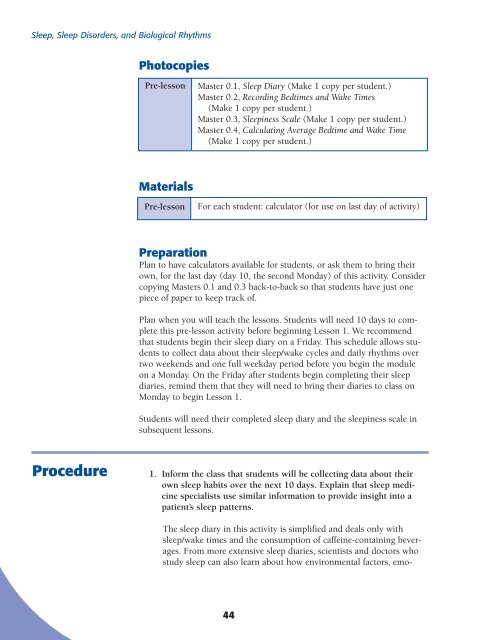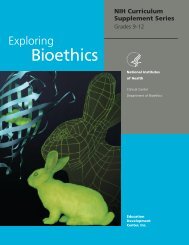Biological - NIH Office of Science Education - National Institutes of ...
Biological - NIH Office of Science Education - National Institutes of ...
Biological - NIH Office of Science Education - National Institutes of ...
You also want an ePaper? Increase the reach of your titles
YUMPU automatically turns print PDFs into web optimized ePapers that Google loves.
Sleep, Sleep Disorders, and <strong>Biological</strong> Rhythms<br />
Photocopies<br />
Pre-lesson<br />
Master 0.1, Sleep Diary (Make 1 copy per student.)<br />
Master 0.2, Recording Bedtimes and Wake Times<br />
(Make 1 copy per student.)<br />
Master 0.3, Sleepiness Scale (Make 1 copy per student.)<br />
Master 0.4, Calculating Average Bedtime and Wake Time<br />
(Make 1 copy per student.)<br />
Materials<br />
Pre-lesson<br />
For each student: calculator (for use on last day <strong>of</strong> activity)<br />
Preparation<br />
Plan to have calculators available for students, or ask them to bring their<br />
own, for the last day (day 10, the second Monday) <strong>of</strong> this activity. Consider<br />
copying Masters 0.1 and 0.3 back-to-back so that students have just one<br />
piece <strong>of</strong> paper to keep track <strong>of</strong>.<br />
Plan when you will teach the lessons. Students will need 10 days to complete<br />
this pre-lesson activity before beginning Lesson 1. We recommend<br />
that students begin their sleep diary on a Friday. This schedule allows students<br />
to collect data about their sleep/wake cycles and daily rhythms over<br />
two weekends and one full weekday period before you begin the module<br />
on a Monday. On the Friday after students begin completing their sleep<br />
diaries, remind them that they will need to bring their diaries to class on<br />
Monday to begin Lesson 1.<br />
Students will need their completed sleep diary and the sleepiness scale in<br />
subsequent lessons.<br />
Procedure<br />
1. Inform the class that students will be collecting data about their<br />
own sleep habits over the next 10 days. Explain that sleep medicine<br />
specialists use similar information to provide insight into a<br />
patient’s sleep patterns.<br />
The sleep diary in this activity is simplified and deals only with<br />
sleep/wake times and the consumption <strong>of</strong> caffeine-containing beverages.<br />
From more extensive sleep diaries, scientists and doctors who<br />
study sleep can also learn about how environmental factors, emo-<br />
44

















